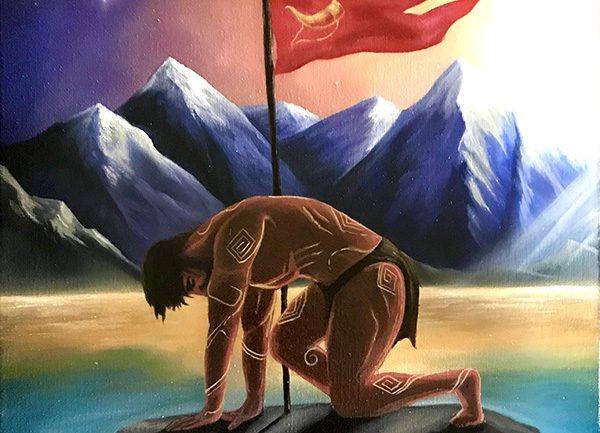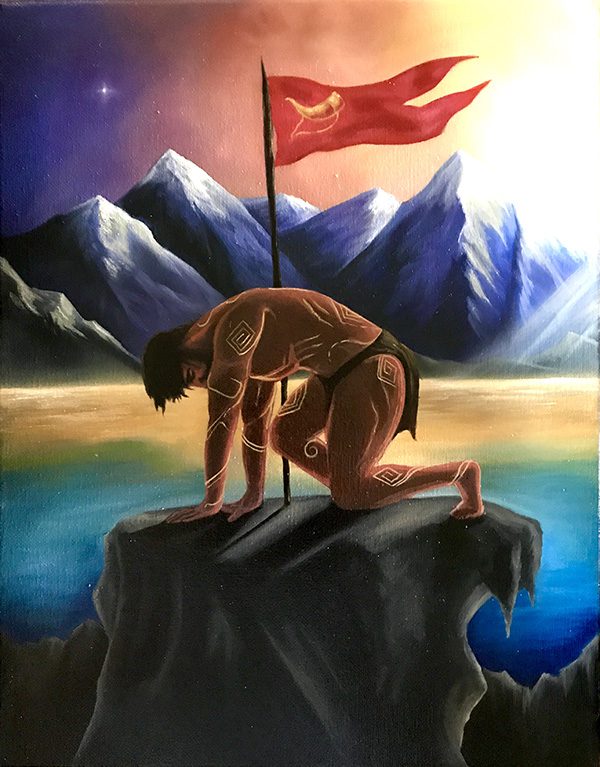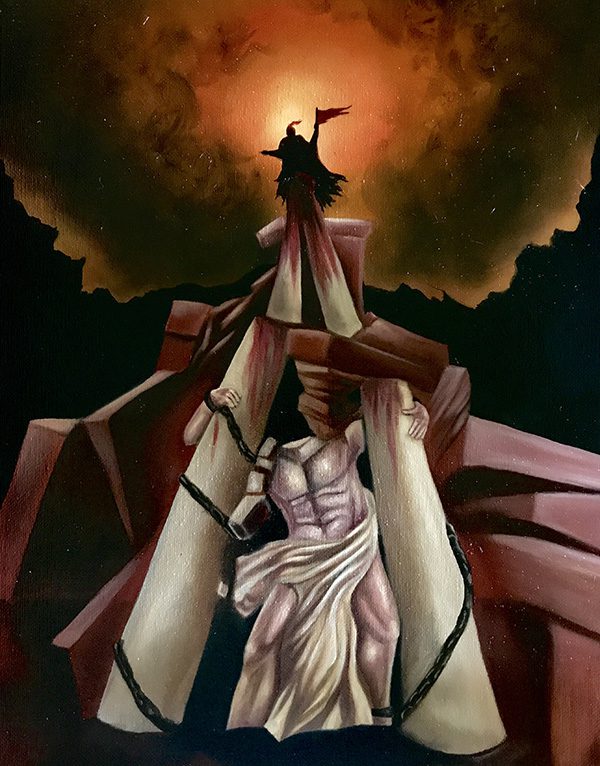Determination
The Hero is a fortress of determination. Giving up is not an option. Persistence is one of their greatest assets. It is almost as if the Hero CANNOT give up even if they wanted to, so strong is the need to continue on to the end and to fulfillment. The Hero is a like mountain climber. The steeper the climb the more vigor and interest the Hero has for the task. They must reach to top of the mountain, anything short of that is the same as having never started. So failure is not possible. The Hero enjoys being challenged. An obstacle is no more than a puzzle to be worked out and they can become single minded about solving it or overcoming it. They know that challenges help them grow and develop endurance and so they embrace them as training exercises. This practice provides the confidence in their ability to overcome anything.
The Inner Journey
The Hero is aware that the quest is an inner one. They respond to the call of the quest by being willing to take risks and to fall down. The Hero knows all the answers to this journey are inside. They live in the inner world much more than the outer although they seem to have a knack for bridging the two worlds together. The real journey is the inside one and the Hero knows that the outer world is a mirror for the inner world. This is one reason the Hero enjoys fantasy and myths because they both originate from the inner world and tell the story, the lessons and failures of the hero. The Hero feels driven to achieve consciousness, overcome the darkness and gain mastery over the inner dragon.
Humility: The Painful Lesson
Humility will keep the Hero on the true path and not allow temptation of superiority and greatness pull him or her off of the path. It is through humility that the Hero gains access to the inherent wisdom that is connected to the archetype. Without humility the Hero quickly becomes a villain: an arrogant, self centered, power-monger. The Hero will often encounter humiliating experiences or devastating failures to help him or her maintain or return to the true path. Because they are re-bounders, this humiliation serves as a guidepost and the Hero accepts the failure with dignity.
Power
Becoming empowered and learning to manage that power is deeply embedded in the Hero archetype. We see this pattern in many famous literary characters and comic book heroes. Harry Potter becomes empowered with magic both dark and light. He must learn to wield it at Hogwarts. Frodo Baggins is given the greatest dark power in existence and he must carry it across the Middle Earth without letting it destroy him. Sherlock Holmes has the power of intellect that helps him solve impossible crimes but also leaves him vulnerable to flattery and self importance. Each character possesses a great power that can either be his or her salvation or destruction. Power for the Hero is always a double edged sword. Learning to empower others is one of the great lessons for the Hero. The Hero will not accept admiration and worship knowing that it often disempowers the giver. By empowering others, the Enlightened Hero maintains his or her own true power.
Legacy
The Hero archetype knows that he or she must pass on the wisdom and knowledge of their own experience and their journey. This is done through legacy work. The Hero must not only accomplish all that they desire but they must provide a way for others to do the same. The Hero is often alone in their struggles but what they accomplish is not for them alone. It must benefit and serve others. Superman, Wonder Woman, Wolverine, Spider Man and so on, all use their power in the service of others and often at great sacrifice to themselves. This is their legacy. What is yours?
Some key words and phrases associated with this archetype:
- Strong
- Determined
- Overcoming
- Challenges
- Legacy
- Power
- Humble
- Journeys
The Villain
Self-Centered
The Villain is not relationship-focused. They can be very selfish and indifferent to others. They are blinded in their drive to fulfill their quest and cannot see that they are supported and aided by others continually. They are however, aware that others are watching them and the Villain needs to prove their abilities and highlight their successes. They secretly want others to look up to them and admire them.The Villain lacks both humility and self awareness.
Ignoring the Call
The Hero hears the call of the personal quest, the Villain often refuses the call or tries to create a quest of their own making. But the inner call cannot be quelled. Resistance can result in depression, unreasonable bursts of anger and/or escapism through addictions or avoidance behaviors. Or conversely, they resist the call by trying to fix others who appear weak or in need of direction. They might feel compelled to push others onto the journey that they themselves refuse to take.
Escapism and Fantasy
The Villain can get lost in stories and fantasy, providing them with the feeling that they have actually performed feats of wonder themselves: a pseudo-accomplishment. This pretend success gives the Villain a false sense of their own abilities as well as their own limitations. They live out their struggle through the safety of books, movies and video games. They may also find that imagining that they are doing things is adequate for providing them with a feeling of success rather than results. This type of escapism is a way for the Villain to avoid the challenges while still pretending that they want challenges. If the Villain is in the grip of depression they may use escapism to distract themselves from the torment of the inner conflict by finding ever more creative ways to avoid it.
Superiority
The Villain often has a superiority complex. They can be overly competitive at any challenge or they may feign indifference if they think that they are not up to the task. The fear of failure, appearing weak and public humiliation are negative forces that drive the behavior of the Villain and they will go to great lengths to prevent others from seeing their weaknesses. While they might be comfortable talking about a failure after the fact, they will rarely share much about it while they are in the midst of their struggle. Their deep fears of vulnerability may make them project false confidence to hide their feelings. They project invincibility and authority but keep themselves fully armored. The Villain is weak, insecure and obstinate.
Alone at the Top
In the quest to achieve all that they desire the Villain sees other people as “a means to an end.” People are used as a tool to further the desires of the Villain. They want to rise to the top and often step on others to get there. The Villain does not want to share power, glory or success with any one. This leaves the Villain utterly alone and in times of struggle and fear, the Villain has no one to turn to. But they are afraid of help and support because asking for help is humiliating, and accepting help diminishes the quality and value of their suffering or their success. They push others away from them and often make others feel diminished and dis-empowered as a way to feel more powerful themselves. By highlighting others weaknesses the Villain attempts to reinforce their own sense of importance.
The Fall
The Villain will eventually experience a fall. The collapse of the structure they use to maintain their sense of importance and superiority is the most important experience for the Villain. Each descent from the heights of arrogance offers the opportunity for transformation of the shadow into the light.
Some words and phrases associated with the The Villain Archetype
- Arrogant
- Self Centered
- Guarded
- Isolated
- Superiority
- Flattery
- Indifferent
- Escapism
A few questions to ask to help transform the Villain into the Hero:
- What is the difference between self respect and the admiration of others?
- What would be humiliating for you to experience in terms of the Hero/Villain archetype?
- How do you express your vulnerabilities?
- What would it mean to allow others to really help you?
- Have you heard the call? Did you heed it or ignore it?
- Do you use people, and if so, how?
- What is the purpose of humility and can you describe what it feels like to experience humility?
- What characters from history film or literature do you admire?
- What is the purpose of (your personal) hero’s quest?
- 10.How and when have you fallen from your own pedestal? What was that like?



